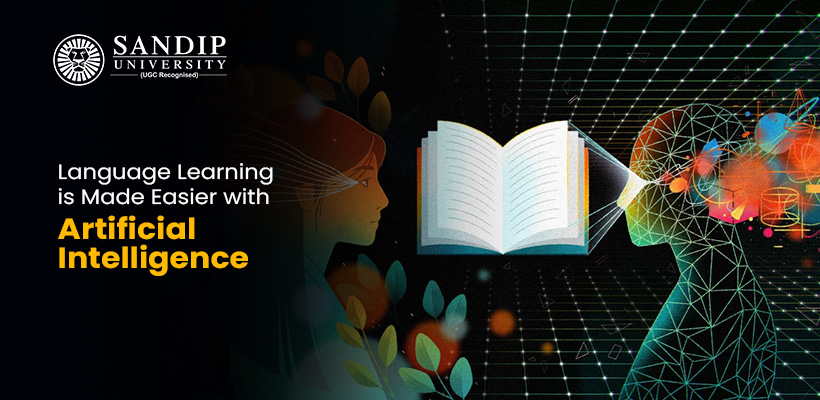Learning a language has always been necessary for developing oneself, moving forward in one’s job, and comprehending different cultures. Traditional language learning techniques, however, can be time-consuming and not necessarily successful. Artificial intelligence (AI) is transforming language learning, making the process more approachable, effective, and pleasurable as a result of the rapid improvements in technology.
Most top computer engineering colleges in Maharashtra provide language learning courses to their students for their professional growth. We will discuss the effects of AI on language acquisition as well as well-liked methods, tools, and upcoming developments driven by AI in this blog.
How Artificial Intelligence is Changing Language Instruction
1. The Emergence of Language Applications with AI
Due to its capacity to adjust to the requirements and preferences of specific learners, AI-powered language learning applications are growing in popularity. These applications make learning more effective and interesting by analysing user progress using machine learning algorithms and offering tailored feedback and recommendations.
2. Tailored Educational Encounters
Personalised learning experiences are one of the main advantages of AI in language learning. With AI’s ability to assess a learner’s strengths and shortcomings, an app’s material and difficulty level may be customised to meet the needs of each user. Learners advance more swiftly and efficiently with this focused strategy.
Advantages of AI in Language Learning
1. Quicker Learning Process
AI-powered language learning systems may dramatically accelerate the learning process by delivering rapid feedback, identifying areas for development, and changing learning materials as needed. This enables students to focus on their deficiencies and make quick progress.
2. Better Pronunciation and Accent
One of the most difficult components of language acquisition is mastering pronunciation and accent. AI-powered technologies can give real-time feedback on pronunciation, allowing students to rectify their errors and acquire a more realistic accent.
3. Enhanced Accessibility
AI has made language learning more accessible to folks who may not have access to traditional learning materials. Anyone with a smartphone and an internet connection may learn a new language from anywhere in the globe using AI-powered applications and platforms.
4. Enhanced Motivation and Involvement
Gamification and individualised feedback are frequently used in AI-powered language learning programs to help learners stay motivated and interested. This is especially critical for sustaining a long-term commitment to language acquisition.
Popular AI-Powered Language Learning Tools
TalkPal
TalkPal is a popular, high-performing language learning software that personalises learning sessions with artificial intelligence. Customers strongly recommend it since it makes learning a language enjoyable.
Duolingo
Duolingo is a famous language learning program that employs artificial intelligence to tailor learning experiences. The app offers a range of interesting exercises, quizzes, and games that are tailored to the user’s ability level and learning preferences.
Rosetta Stone
Rosetta Stone is a popular language learning program that uses voice recognition technology and AI algorithms to deliver tailored feedback and recommendations. To meet the demands of many learners, the platform provides a diverse choice of languages and learning resources.
Babbel
Babbel is another popular AI-powered language learning software that focuses on realistic, everyday interactions. The app employs machine learning algorithms to adapt the content and difficulty level based on the user’s progress and preferences.
Mondly
Mondly is a language learning software that uses AI chatbots and speech recognition technologies to provide immersive and engaging learning experiences. The app includes courses in over 30 languages and delivers real-time feedback on speech and grammar.
The Use of Chatbots in Language Learning
a) Chatbot Features and Benefits
AI-powered chatbots can aid language learning by imitating real-world discussions with native speakers. Chatbots can interpret and respond to user input, facilitating interactive and interesting practice sessions. These talks can help you develop your speaking abilities, gain confidence, and become more fluent.
b) Examples of Language Learning Chatbots
Some prominent language learning chatbots include Mondly’s conversational chatbot, Duolingo’s language bots, and Replika, a chatbot meant to develop conversational skills in several languages.
Voice Recognition and Artificial Intelligence
Voice recognition technology is vital in AI-powered language learning aids since it allows the app to interpret and evaluate the learner’s speech. This provides real-time feedback on pronunciation and accent, allowing the user to enhance their speaking abilities more effectively. Some of the best computer science engineering colleges in Nashik offer specialisation in artificial intelligence to train future engineers in this field.
AI-powered Speech Recognition for Language Learning
AI-powered speech recognition technology can deliver more accurate and nuanced pronunciation feedback, accounting for stress, intonation, and rhythm. This can help learners create a more natural accent and enhance their overall speaking abilities.
AI’s Future in Language Learning
1. Virtual and Augmented Reality
The combination of virtual reality (VR) and augmented reality (AR) technologies with AI-powered language learning tools may result in even more immersive and engaging learning experiences. Learners might practise their language skills in virtual environments that mimic real-life scenarios, making the learning experience more interesting and successful.
2. Advanced Customisation
As AI technology advances, we should expect increasingly advanced customisation in language learning systems. AI systems might evaluate learners’ learning styles, preferences, and emotional states to provide highly personalised learning experiences.
3. Collaborative Learning
AI might also enhance collaborative learning experiences, allowing learners from all around the world to practise their language skills together. This might bring value.
Conclusion
Artificial intelligence has unquestionably transformed language acquisition, making it more accessible, efficient, and entertaining than ever before. With improvements in AI technology and the incorporation of cutting-edge technologies such as VR and AR, the future of language learning appears quite bright.
However, it is critical to understand AI’s limits and realise the value of human contact in the language acquisition process. Learners may attain their language goals while also opening new chances for personal and professional development by integrating the best of both worlds.

